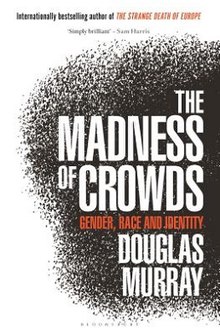The Madness of Crowds: Gender, Race and Identity
 First edition | |
| Author | Douglas Murray |
|---|---|
| Language | English |
| Subjects | Politics, race, LGBT, feminism |
| Publisher | Bloomsbury Publishing |
Publication date | Sep 17, 2019 |
| Media type | Print (Hardcover and Paperback) |
| Pages | 288 |
| ISBN | 978-1-63557-998-7 |
The Madness of Crowds: Gender, Race and Identity is a 2019 book by conservative British journalist and political commentator Douglas Murray. It was published in September 2019.
Thesis[]
The book examines issues of sexual orientation, feminism, race and transsexuality. It describes new culture wars playing out in workplaces, universities, schools and homes in the names of social justice, identity politics and intersectionality.[1] Murray's book is divided into four main sections which align with different identity groups: "Gay", "Women", "Race" and "Trans", with Murray arguing that modern attitudes to each have been distorted by a sense of victimhood and the negative impact of political correctness.[2]
The book points to what Murray sees as a cultural shift, away from established modes of religion and political ideology, and towards a society in which various forms of victimhood can provide markers of social status.[3] The book is divided into sections dealing with different forms of identity politics, including types of LGBT identity, feminism, and racial politics.[4] The author criticises the work of French philosopher Michel Foucault for what he sees as a reduction of society to a system of power relations.[5]
Reception[]
The Madness of Crowds received mixed reviews from critics. Tim Stanley in The Daily Telegraph praised the book, calling Murray "a superbly perceptive guide through the age of the social justice warrior".[6] Katie Law in the Evening Standard said that Murray "tackled another necessary and provocative subject with wit and bravery".[7] Writing for the Financial Times, Eric Kaufmann said that Murray's book "performs a great service in exposing the excesses of the left-modernist faith.[8]
Conversely, William Davies in The Guardian was highly critical of the book, describing it as "the bizarre fantasies of a rightwing provocateur, blind to oppression."[9] Davies was particularly sceptical of Murray's notion that the social sciences, typified by thinkers like Michel Foucault and Judith Butler, had become dominated by Marxist influences, and noted the irony of Murray championing liberal values while praising the authoritarian Hungarian prime minister Viktor Orbán.[9]
References[]
- ^ "The Madness of Crowds by Douglas Murray — slay the dragon, then stop". Financial Times. Retrieved 25 October 2020.
- ^ Murray, Douglas (2019). The Madness of Crowds: Gender, Race and Identity (1st ed.). London: Bloomsbury Continuum. ISBN 978-1-4729-5997-3.
- ^ Matthew Goodwin (22 September 2019). "The Madness of Crowds by Douglas Murray review – identity politics attacked". The Sunday Times. Retrieved 2 October 2019.
- ^ Lionel Shriver (19 September 2019). "The Madness of Crowds by Douglas Murray review – why identity politics has gone too far". The Times. Retrieved 2 October 2019.
- ^ Kearns, Madeleine (2018-09-06). "Douglas Murray Interview: 'The Madness of Crowds' Author on Gender, Race & Identity". National Review. Retrieved 2019-10-04.
- ^ Tim Stanley (27 September 2019). "The Madness of Crowds by Douglas Murray, review: unleashing a liberal dose of outrage". Telegraph.co.uk. Retrieved 2 October 2019.
- ^ "The Madness of Crowds by Douglas Murray - review". London Evening Standard. 19 September 2019. Retrieved 2 October 2019.
- ^ Kaufmann, Eric (11 October 2019). "The Madness of Crowds by Douglas Murray — slay the dragon, then stop". Financial Times. Archived from the original on 6 October 2020. Retrieved 22 December 2020.
- ^ a b William Davies. "The Madness of Crowds by Douglas Murray review – a rightwing diatribe | Books". The Guardian. Retrieved 2 October 2019.
- 2019 non-fiction books
- Political books
- British non-fiction books
- Books by Douglas Murray (author)
- Bloomsbury Publishing books
- United Kingdom political book stubs